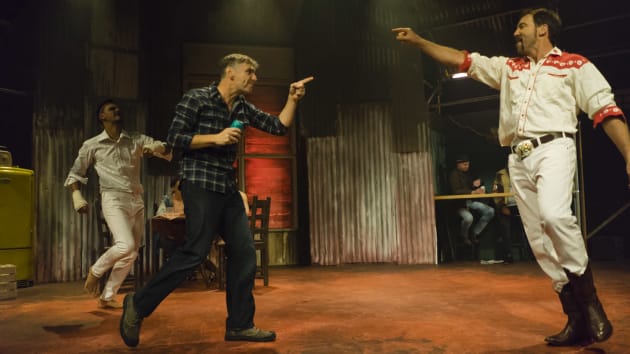Subiaco Arts Centre, 12 July
First performed in 2013 in Berlin, this revised production of Good Little Soldier is directed by Mark Howett, artistic director of Perth-based Ochre Contemporary Dance Company, and is a collaboration between Ochre and Gold Coast-based The Farm, a collective of designers, artists and performers. The work excoriates the torment endured by sufferers of post-traumatic stress disorder and those nearest to them, and reflects Howett’s own family’s post war experience of PTSD. It is engrossing, disturbing, text-based physical theatre, exceptionally well performed.
Designer Bryan Woltjen’s superb unmistakably Australian set and costumes create context and atmosphere. Weathered corrugated iron panels and grimy louvred windows become a house, a pub and a projection screen; scaffolding provides a platform for musicians. Washing lines, a kitchen table and a yellow round-edged refrigerator with a transistor radio atop suggest benign domesticity.
Edgy lighting by Howett and associate Chloe Ogilvie captures the sudden shifts between relative normality and volatility as returned soldier Frank (The Farm’s Gavin Webber), his wife Trish (Raewyn Hill) and son Josh (Duncraig Senior High Year 12 student Otto Kosok in an impressive professional debut) struggle to cope with Frank’s developing PTSD.
A riveting, sentient soundscape by sound designer Laurie Sinagra and composers Matthew De la Hunty and Dale Couper lurches between a recurring song, melodic voice, and ear-piercing effects, didgeridoo, and shattering gunfire, mirroring the unpredictability of events. De la Hunty and Couper also perform live.

Frank’s hallucinations involve visions of Max (The Farm’s Grayson Millwood) and Mike (Nyoongar actor/dancer Ian Wilkes), two deceased fellow soldiers who first appear in military camouflage shirts and slouch hats. It comes as a shock to realise that Frank is the only one who ‘sees and hears’ the lively pair.
An ensemble comprising the cast together with Howett and dramaturg Phil Thomson is credited with devising the inter-related text and movement. Extensive use of softly-spoken conversational dialogue creates a sense of prying into private lives. Raked seating on three sides of the stage provides a close connection as audience members become stricken, helpless bystanders.
Some scenes need tightening. And an audience participation Q&A session midway was skilfully conducted by Wilkes and Millwood but interrupted dramatic momentum. And some responses to the posed question: “What are the reasons for war?” sat uneasily within the premise of this work.
Hill’s performance as Trish was admirable. With taut physicality and grim-faced anticipation, she showed Trish’s ever-vigilant alert to the warning signs of Frank’s mood shifts, and her heartbreaking, tempered joy when Frank brings her flowers. Hill’s choreographed, potently enacted battle against unseen forces she can’t control, echoing Trish’s powerless situation, was a tour de force. And Hill and Webber’s slow dance to “Falling in Love Again” and its descent into violence is unforgettable.
Also outstanding, Webber was a dominant yet tragic presence throughout. Early in the performance he, Millwood and Wilkes are silhouetted against the louvres in a perilous army training-style manoeuvre requiring support, physical strength, trust and courage. It is evident PTSD sufferers and their families need all of these elements, especially support, as Good Little Soldier concludes in cacophony and chaos.
Margaret Mercer
Good Little Soldier plays until 30 July.
Top photo: Otto Kosok & Gavin Webber. Photo: Peter Tea.



